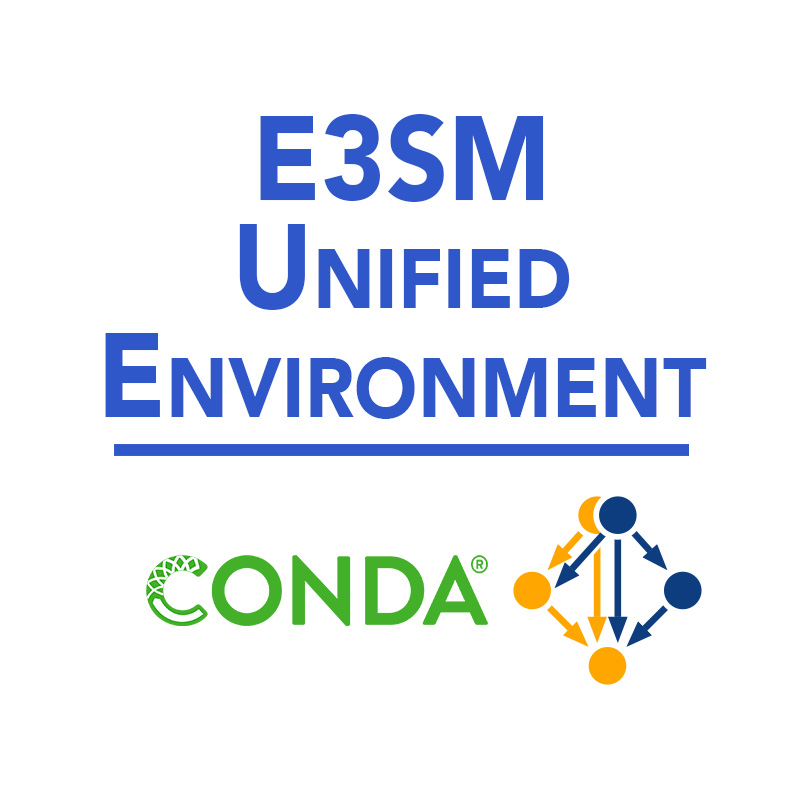E3SM-Unified 1.9.0

E3SM-Unified is a combination of conda and spack environments that ensures that all E3SM-supported software tools are available, coexist together and work seamlessly. All packages upon which the tools depend are included and coordinated to ensure that all tool dependencies are satisfied. Simply by installing this environment, any of the E3SM-supported tools are readily accessible to use.
The new version includes additions and updates to several packages developed by the E3SM team including ChemDyg, E3SM Diags, e3sm_to_cmip, ncvis, MPAS-Analysis, MOAB, NCO, xcdat, zppy, and zstash.
E3SM-Unified is available on 7 machines supported by E3SM: Acme1 (LLNL), Andes (ORNL), Anvil (ANL), Chrysalis (ANL), Compy (PNNL), Frontier (ORNL), and Perlmutter (NERSC). It can also be installed on a personal machine as a conda package.
New and improved in 1.9.0
ChemDyg: This new package provides diagnostics for the interactive gas-phase chemistry, newly available in E3SM, to support routine testing and evaluation of the chemistry performance.
E3SM Diags: This new release adds one new set: mixed phase partition diagnostics (mp_partition), also known as T5050 diagnostics. The ARM diagnostics (arm_diags) set is enhanced with new aerosol-cloud-interaction and aerosol activation metrics developed by ARM infrastructure team. The aerosol budget diagnostics (aerosol_budget) is updated by including global mean burdens, source/sink budgets and lifetimes for aerosol species contributed by Aerosol Working Group. GPCP v3.2 precipitation data is added to replace an older version (v2.2). Surface relative humidity and wind speed data set derived from ERA5 are added as standard evaluation sets.
e3sm_to_cmip: The latest release includes a major revamp in the implementation of land and atm variable handlers. Handlers are now defined a single yaml file rather than as individual Python modules. More information can be found in the Variable Handlers documentation page. Other improvements include better error handling, a smoother development experience and updated documentation and examples.
MPAS-Analysis: This release adds new waves analysis and moves to Adusumilli et al. (2020) for Antarctic melt-rate observations as well as numerous minor enhancements and bug fixes.
MOAB: Significant improvements in both robustness and performance for parallel, conservative map generation, and extensions to support bilinear map projections through TempestRemap v2.2.0.
ncvis: A newly developed graphical tool that supports visualizing NetCDF data on unstructured grid.
NCO: Simplified invocation of quantization and codecs. CF-compliant longitude boundaries. Fixes for Intel compilers. NCZarr features. Vertical interpolation improvements. EAMxx support.
xcdat: The latest release includes feature updates to support an optional user-specified climatology reference period when calculating climatologies and departures, and improved support for using custom time coordinates in temporal APIs. It also includes a bug fix for singleton coordinates breaking the swap_lon_axis() function. Additionally, Jupyter Notebooks for presentations and demos have been added to the documentation.
zppy: This release introduces plugin functionality – users can now create plugins to add custom tasks to zppy. Additionally, users can now 1) choose to generate all variables in climo or ts by setting vars="", 2) directly choose the value for the ncclimo --parallel option, and 3) generate hemispheric time-series plots.
zstash: This release adds a couple new options. The --include option allows users to specify which files to include. The --follow-symlinks option allows users to copy symlinks, which is helpful in preventing broken links.
Details
After over 2 months of testing, the new version is expected to be deployed in the coming weeks on the 7 supported machines. We have dropped support for Cori (NERSC) in this release, as it has been decommissioned.
On 5 machines (Anvil, Chrysalis, Compy, Frontier, and Perlmutter) there are 6 commonly used packages — ESMF, ILAMB, MOAB, NCO, TempestExtremes, and TempestRemap — that have been built with Spack with system compilers and MPI libraries (matching the modules used for E3SM whenever possible). When users load E3SM-Unified on a compute node, they will have access to these versions, which can be run in parallel and will typically run more efficiently than their counterparts in conda packages.
Next version
Testing of the next version (1.10.0) is planned to begin in early November 2023 and deployment is expected in early December. The community can request a new package or changes in the next E3SM-Unified by posting an issue on GitHub.
Resources
- main page: E3SM Unified Environment
Contact
- Xylar Asay-Davis, Los Alamos National Laboratory
This article is a part of the E3SM “Floating Points” Newsletter, to read the full Newsletter check:


